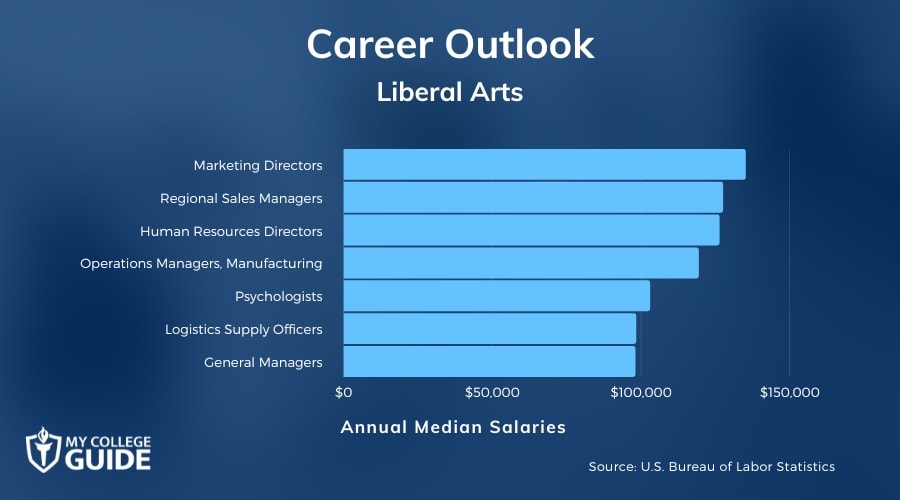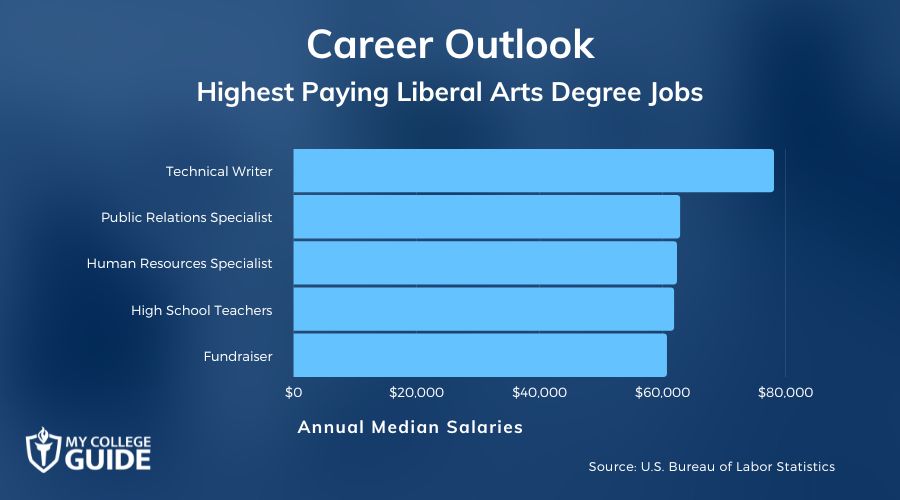There is a world of liberal arts careers available for those who are looking for a broad degree, from English and literature to sales and corporate business.

While having a degree doesn’t guarantee instant success, a liberal arts degree can prepare you for a multitude of opportunities. This degree program provides skills in various subjects such as science, math, English, and more.
Editorial Listing ShortCode:
Studying for a liberal arts degree can be a great start to a lasting career, and offer you the flexibility to choose various career paths. This article provides you with information on the various jobs you can get with a liberal arts degree.
What Can You Do With a Liberal Arts Degree?

The careers with a liberal arts degree vary widely, which shows why a liberal arts degree can be a benefit to those seeking different careers.
Whether you have a head for numbers or dream of teaching at a respected college, there is something for everyone when you customize your liberal arts degree program to suit your end goals. With a liberal arts degree, you can choose to work in the art and design industry as a graphic designer or photographer. The art and design industry is projected to grow 2% over the next 10 years.
Editorial Listing ShortCode:
Perhaps you are more interested in marketing, where you can use your liberal arts degree to work in advertising or promotions. Marketing positions are expected to see a 10% growth over the next decade providing a lot of opportunities for liberal arts graduates.
If English is your passion, a liberal arts degree can set you up for success as an editor, which is expected to see a 5% increase in jobs over the next 10 years, a writer, or a journalist.
10 Things You Can Do with a Degree in Liberal Arts
One of the benefits of earning a liberal arts degree is the flexibility it can give you in terms of choosing a career. A liberal arts major may qualify you for a wide variety of jobs in many different fields.
1. Editor

An editor is a person responsible for the editing of written content. Editors are found wherever there is writing that will be read by the public.
They review the copy and ensure it is grammatically correct, fits their organizational style, is clear, and stays on the message.
2. Secondary School Teacher

A secondary school teacher is an educator that works at a secondary school. They usually specialize in one subject, such as math, biology, chemistry, English, or history.
Teachers are licensed by their state to teach a certain subject and grade level. School districts may also have extra requirements for their teachers. Teachers develop lesson plans based on state curriculums and evaluate their students using tests, quizzes, and other assignments.
3. Journalist

A journalist is a type of writer that reports the news. Journalists work to deliver to the public accurate news stories soon after they happen.
Journalists can work for traditional newspapers, or for TV and radio stations and news websites. Journalists may also work on their own as freelancers.
4. Salesperson

A salesperson is someone who works in sales, selling their organization’s product or service. Salespeople are gregarious and use their communication skills to communicate the benefits of their product or service to potential or existing customers. They develop relationships with clients and ensure their needs are being met.
5. Public Relations Specialist

A public relations specialist is a public relations practitioner that works with an organization to manage the organization’s public image and get its message out to the public.
Public relations specialists may use their communication and writing skills on a daily basis to write press releases or other communications. They respond to requests for information and interviews from journalists and evaluate their organization’s image, working with other PR people to craft a strong public relations strategy.
6. Human Resources Specialist

A human resources specialist is a professional people manager. They assist with the hiring, recruiting, training, and evaluation of organization personnel.
Editorial Listing ShortCode:
They manage the human resources of an organization, allocating resources to where they are needed and ensuring the organization’s processes can run efficiently.
7. Real Estate Agent

Real estate agents are salespeople at the core. They work by assisting individuals to buy or sell houses. They will work with sellers by listing their property on the market and showing it to potential buyers.
Real estate agents may also determine a property’s market value and will usher their clients through the entire purchasing/selling process.
8. Postsecondary Education Administrators

Postsecondary education administrators work by managing and organizing higher education institutions. They oversee student affairs, academics, admissions, sports, and other key aspects of university management. They may also work with students and college staff to help with tuition financing options, such as financial aid.
9. Management Consultant

A management consultant is brought into an organization to make recommendations and develop new management practices to ensure greater organizational efficiency.
Management consultants usually have backgrounds as managers and know the ins and outs of how organizations operate. They analyze how organizations operate and use a variety of analysis methods to evaluate performance and recommend new procedures and practices in hiring or other areas.
10. Fundraiser

A fundraiser is a person that works to raise funds for an organization. They do this by reaching out to likely donors and getting them engaged in an organization’s goals and vision.
Fundraisers have extremely developed interpersonal skills as they cultivate relationships with donors. They will plan and oversee fundraising events and campaigns for a variety of causes, including charity work, political campaigns, and other initiatives.
Liberal Arts Careers & Salaries

You may be wondering, “What can I do with a liberal arts degree?” With the wide range of career paths associated with a liberal arts degree, we have put together a list of the top 40 liberal arts careers & salaries according to data from the U.S. Bureau of Labor Statistics.
| Careers | Annual Median Salaries |
| Marketing Directors | $135,030 |
| Regional Sales Managers | $127,420 |
| Human Resources Directors | $126,230 |
| Operations Managers, Manufacturing | $119,260 |
| Psychologists | $102,900 |
| Logistics Supply Officers | $98,230 |
| General Managers | $97,970 |
| Business Teachers, Postsecondary | $94,360 |
| Bank Examiners | $81,410 |
| Movie Producers | $79,000 |
| Casino Managers | $76,910 |
| Business Operations Specialists | $76,040 |
| Community Service Directors | $74,000 |
| Writers | $69,510 |
| Market Research Analysts | $63,920 |
| Investment Bankers | $62,910 |
| Executive Assistants | $62,060 |
| Real Estate Brokers | $62,010 |
| Archaeologists | $61,910 |
| Special Education Teachers | $61,400 |
| Social Workers | $61,190 |
| Office Services Supervisors | $60,590 |
| Career Counselors | $60,510 |
| Hotel Managers | $59,430 |
| Social Workers | $50,390 |
| Insurance Agents | $49,840 |
| Family Service Caseworkers | $49,150 |
| Real Estate Agents | $48,770 |
| Office Managers | $48,684 |
| Substance Abuse Counselors | $48,520 |
| News Reporters | $48,370 |
| Real Estate Agents | $48,340 |
| Payroll Bookkeepers | $47,610 |
| Mental Health Counselors, Outpatient | $47,550 |
| Employment Clerks | $45,630 |
| Counselors | $45,160 |
| Student Admissions Clerks | $43,160 |
| Assistant Store Managers | $39,230 |
| School Secretaries | $37,880 |
Just as careers in liberal arts vary, salaries have a wide range as well. As with any career ideas, experience and educational level play a large role in salary outcome.
When considering the liberal arts career outlook, there are several factors to take into consideration. To get a clearer picture, students should consider the outlooks and growth rates of several common industries associated with the liberal arts.
Editorial Listing ShortCode:
For example, the Bureau of Labor Statistics projects that careers in the arts and design occupations are projected to increase by 2% over the next decade, which will add 20,500 to the market. Alternatively, the real estate job market is expected to grow by 5% adding around 54,800 jobs.
To give yourself an edge in the competitive job market, it can pay off to identify the liberal arts discipline that you are most interested in early on in your educational journey. This will give you the opportunity to learn specialized skills to supplement the desirable management and leadership traits that employers are looking for in recent college graduates.
What Is a Liberal Arts Degree?

A liberal arts degree is a degree program aimed to help you learn skills to enter the workforce, such as problem-solving skills, communication skills, and more.
Some may associate the liberal arts with a degree that is too general to have much of an impact once students were ready to enter the workforce. It’s important to keep in mind, while liberal arts may have a lot of general courses, after completing the degree program you will likely be a well-rounded graduate with a wide range of skills.
Liberal arts encompasses many disciplines, including college majors such as:
- English
- Literature
- Communications
- Psychology
- Sociology
- Creative arts
- Anthropology
- History
The unifying factor in all liberal arts programs is their interdisciplinary focus. At the bachelor’s level, you will focus on a broad overview of the arts, sciences, and humanities.
In higher-level degree programs, many colleges offer ways to customize your degree to learn advanced skills that can be applied in the workforce. If you need a flexible schedule to accommodate your work or family obligations, many universities even offer reputable liberal arts degrees online.
What is a Liberal Arts Degree Good for?

Liberal arts degrees are designed with flexibility in mind. Typically, these majors allow students to choose from a wide variety of classes to design a path that best suits their wants. In terms of jobs for liberal arts majors, a liberal arts degree fosters a wide variety of skills in students, including writing and communication skills, critical thinking, and design.
Editorial Listing ShortCode:
Liberal arts degree careers include teaching, writing-based jobs, positions in business and other organizations, and sales jobs. These positions are found in a wide variety of industries, meaning you may have added flexibility in choosing what you would like to do.
What Do You Learn in Liberal Arts?
Liberal arts degrees foster a wide variety of useful and pertinent skills in students. As a liberal arts student, you will be learning how to better communicate, better analysis methods, critical thinking strategies, and writing skills. These types of majors allow you to take a wide variety of classes.
You may choose to take courses in fields as diverse as math, science, education, computer science, history, economics, psychology, English, or engineering. The usefulness of a liberal arts degree is that you get to learn from a wide variety of disciplines and learn many different skills.
What Jobs Can You Get With a Liberal Arts Degree?

There are many paths available in liberal arts degree careers. One potential career is that of a secondary school teacher. The Bureau of Labor Statistics states these positions have a 5% predicted job growth rate in the next ten years.
Another career potentially available for liberal arts degree holders is that of a media and communication worker. These positions have a 5% predicted job growth rate according to the BLS. Becoming a real estate broker or agent may also be a good career choice. The BLS predicts these positions will grow by 5% this decade.
The availability of these jobs, as well as the starting salary, may depend on the job’s location as well as your prior work experience and education.
What Are the Highest Paying Liberal Arts Degree Jobs?

Jobs for liberal arts majors may be lucrative options. According to the BLS, technical writer jobs have a median annual salary of $78,060. This is followed by public relations specialist positions, with an annual median pay of $62,800.
Human resources specialist jobs have a median annual salary of $62,290, the BLS says, while high school teachers make a median annual salary of $61,820. Fundraiser jobs earn a median annual salary of $60,660. There are many factors that influence the salary of these positions. Their location, the employer’s policies, and your prior work experience may influence what the salary will be.
Should I Major in Liberal Arts?
If you are interested in the humanities or natural sciences, then liberal arts may be for you. It is important to remember that only you can know if earning a liberal arts degree is the right move.
There are certainly some advantages to earning a liberal arts degree. The major is designed for flexibility. You may take many different courses from many different disciplines. You may find you like classes from one subject more than others.
At the same time, a liberal arts degree may give you the education and skills you need to enter into varied career fields. You may also choose to earn a graduate degree if you want to continue your education.
What’s the Difference Between Humanities vs. Liberal Arts?

Though there is an overlap between humanities and liberal arts, the two refer to different things.
Liberal arts is:
- Traditional curriculum in Western universities
- Consists of four areas: natural sciences, social sciences, arts, and humanities
- Could be a major
By contrast, the humanities are:
- A group of academic disciplines that study human society and culture
- Composed of history, philosophy, literature, and performing and visual arts
You choose to major in a discipline in the humanities. Universities typically do not offer it as a major itself like liberal arts.
Is a Liberal Arts Degree Worth It?

Yes, a liberal arts degree is worth it for many students. Earning a liberal arts degree may be a great way to take a wide variety of classes and experiment with different subjects. The skills and education you may gain as part of this degree may lead to rewarding careers in different industries such as education, media, or business.
Editorial Listing ShortCode:
According to the BLS, liberal arts degree jobs are fields with good job growth. Secondary school teacher jobs are predicted to grow by 5% in the next ten years. Manager positions are also predicted to increase in this decade, with a strong 6% job growth number.
Getting Your Liberal Arts Degree Online

If you want to take classes in a wide variety of fields, ensuring your college experience is flexible, then liberal arts may be right for you.
Becoming a liberal arts student may open the door to many career possibilities in education or business. You may learn important critical thinking skills to help you in this regard.
If earning a liberal arts degree lines up with your educational and professional goals, then read more to gain valuable information as to where you could apply.
You can also view our Careers in Law and Careers in Marketing guides for more options.
